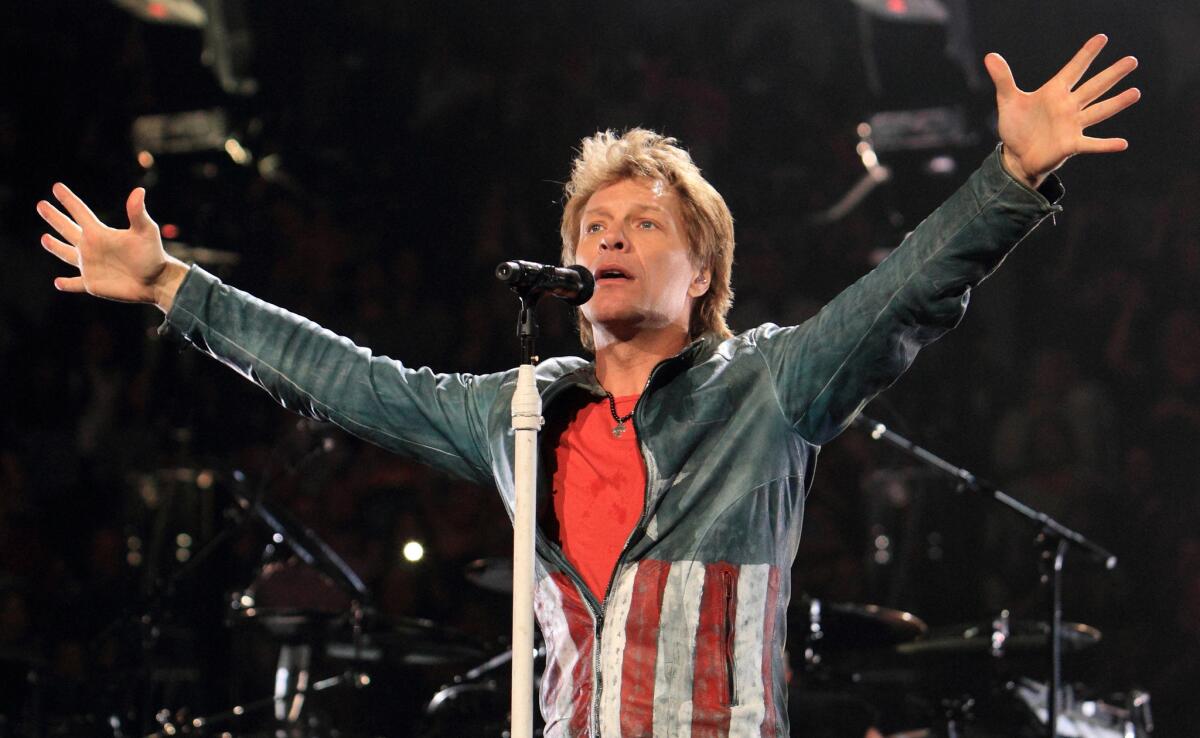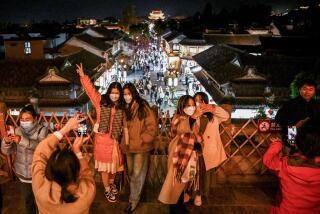Bon Jovi abruptly cancels China tour. Is support for Dalai Lama to blame?

In this Nov. 5, 2013, file photo, Jon Bon Jovi performs in concert with his band on their Because We Can Tour 2013, in Philadelphia.
- Share via
Reporting from BEIJING — The first tour in China for New Jersey rock band Bon Jovi was abruptly canceled this week, leaving many fans speculating that Chinese authorities struck it down for political reasons.
The band was originally slated to perform next Monday in Shanghai and the following Thursday in Beijing. Yet this week, the Beijing and Shanghai tour dates suddenly vanished from Bon Jovi’s homepage; on Wednesday morning, the tour organizer, AEG Live Asia, issued a statement on its official Sina Weibo microblog account, announcing the cancellation of the concert “due to unforeseen reasons.”
“We will offer refunds for all fans who purchased tickets,” it said. “We deeply regret the inconvenience and disappointment it may cause you.”
Chinese Internet users speculated that the cancellations might be related to a 2010 performance by the band in Taipei, in which a backdrop video showed an image of Tibetan spiritual leader the Dalai Lama.
“At the Taipei concert they unexpectedly gave public supported the Dalai Lama, completely ignoring the feelings of mainland people,” wrote a fan on Sina Weibo with the username Jia Liangliu. “The Dalai Lama really is a horrible person.”
SIGN UP for the free Essential Arts & Culture newsletter >>
Beijing reviles the Dalai Lama as a “separatist” because of his expressed hopes for a more autonomous Tibet. The monk fled to India in 1959 after a failed uprising against Chinese control.
On Tuesday, the Financial Times cited “people familiar with the matter” as saying that Chinese cultural officials canceled the Bon Jovi tour once the Taipei concert video came to their attention.
Bon Jovi had drummed up excitement for the shows by posting a video online featuring frontman Jon Bon Jovi singing a Mandarin rendition of one of China’s most popular love songs, “The Moon Represents My Heart.” The band called its YouTube post of the rendition, which has racked up more than 1.3 million views, a “special gift to Chinese fans.”
The Chinese government’s anxiety over famous pop bands’ affiliations with the Dalai Lama date back to a Shanghai concert by Bjork in 2008, during which the Icelandic singer shouted “Tibet! Tibet!” while performing her song “Declare Independence.”
China’s Ministry of Culture said the performance “not only broke Chinese laws and regulations and hurt the feelings of Chinese people, but also went against the professional code of an artist,” reported the official New China News Agency.
Authorities canned a China tour by the British band Oasis in 2009 after discovering that lead vocalist Noel Gallagher had participated in a Free Tibet concert 12 years prior; in 2011, the country barred Linkin Park from performing in China after the metal rap group was photographed with the Dalai Lama at a youth media conference in Los Angeles.
In July, Chinese authorities scrapped a Shanghai stadium show by pop band Maroon 5 after the band’s keyboardist, Jesse Carmichael, sent birthday wishes to the Dalai Lama via Twitter.
This year marks the 50th anniversary of the Communist Party’s formal establishment of Tibet as an “autonomous region” under Chinese control. Officials celebrated Tuesday with a massive ceremony in Tibet in front of Potala Palace, the Dalai Lama’s historical residence in central Lhasa.
“Tibet has achieved sustained stability after people of all ethnic groups steadfastly fought separatism, foiling the sabotage attempts of the 14th Dalai Lama clique and hostile international forces,” said Yu Zhengsheng, a top Chinese official who is a member of the Politburo Standing Committee, the official New China News Agency reported.
Live performances have become a major source of revenue for musicians as record sales and download royalties continue to shrink in the digital age. California-born pop star Katy Perry became the top-grossing musician on Forbes’ Top 100 Celebrity list by taking in a large share of her income through live performances.
As Chinese fans are increasingly exposed to Western artists through the Internet, many musicians have been trying to get a bite of the lucrative Chinese market, despite butting up against the Communist Party’s heavy censorship policies.
Before authorities allowed Bob Dylan to play his first concert in China in April 2011, they required the legendary rocker to submit a set list for prior approval, Dylan said in a statement on his website later that year.
With more Western artists including MUSE and Taylor Swift scheduled to give live performances in China later this year, witty Internet users offered some friendly advice for their beloved stars.
“Looks like singing ‘The Moon Represents My Heart’ was a waste of energy,” one Beijing-based Weibo user wrote. “Maybe a rendition of ‘In the Field of Hope’ would help,” the user wrote, referencing a song that was popularized by Peng Liyuan, a folk singer and the wife of Chinese President Xi Jinping.
Times staff writer Jonathan Kaiman, along with Nicole Liu and Tommy Yang in the Times’ Beijing bureau, contributed to this report.
Follow us @PopHiss.
More to Read
The biggest entertainment stories
Get our big stories about Hollywood, film, television, music, arts, culture and more right in your inbox as soon as they publish.
You may occasionally receive promotional content from the Los Angeles Times.








